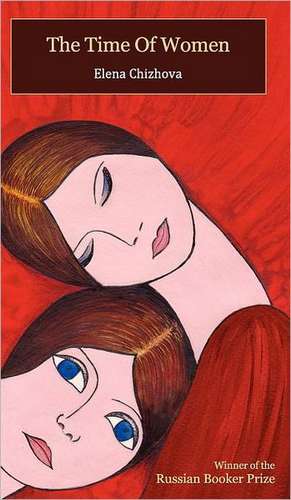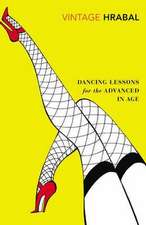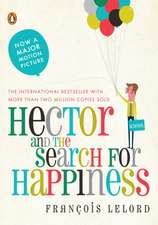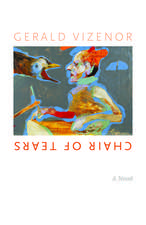The Time of Women
Autor Elena Chizhovaen Limba Engleză Hardback – 31 ian 2012
| Toate formatele și edițiile | Preț | Express |
|---|---|---|
| Paperback (1) | 154.46 lei 22-36 zile | |
| Glagoslav Publications Ltd. – 26 ian 2012 | 154.46 lei 22-36 zile | |
| Hardback (1) | 196.19 lei 22-36 zile | |
| Glagoslav Publications Ltd. – 31 ian 2012 | 196.19 lei 22-36 zile |
Preț: 196.19 lei
Nou
Puncte Express: 294
Preț estimativ în valută:
37.55€ • 40.80$ • 31.56£
37.55€ • 40.80$ • 31.56£
Carte disponibilă
Livrare economică 31 martie-14 aprilie
Preluare comenzi: 021 569.72.76
Specificații
ISBN-13: 9789081823913
ISBN-10: 9081823914
Pagini: 272
Dimensiuni: 127 x 203 x 16 mm
Greutate: 0.4 kg
Editura: Glagoslav Publications Ltd.
ISBN-10: 9081823914
Pagini: 272
Dimensiuni: 127 x 203 x 16 mm
Greutate: 0.4 kg
Editura: Glagoslav Publications Ltd.
Notă biografică
Elena Chizhova, a former economist, teacher and entrepreneur, finally turned to writing in 1996 after being rescued from a burning cruise ship. Since that time she has been consumed by the need to write, and has enjoyed considerable success as a result. Chizhova's prose shuns trickery in favour of emotional honesty in order to probe the weeping sores of Russian history that contemporary culture would sooner forget. Chizhova was born in 1957 in Leningrad, the city which provides the setting for her award-winning novel, The Time of Women, about the secret culture of resistance and remembrance amongst the mothers, grandmothers, aunts and daughters of Russia. Chizhova is the director of the local PEN centre in St. Petersburg. Awards: Russian Booker Prize 2009 Shortlist Russian Booker Prize 2003, 2005 Severnaya Palmira 2001 Award Journal Zvezda 2001.
Recenzii
"Their [women's] story is a simple one. Aside from Antonina's ailing medical condition (she falls ill from cancer), not much happens. But it's the ordinariness of these women's daily drudgery - the endless queues for supplies, the hours boiling dirty rags, the constant cooking of potatoes and bland food - that comes vibrantly alive on the page. A scattered, stream-of-consciousness writing style takes some getting used to, especially at the beginning, and it's often difficult to keep track of which character is doing the narrating or whether a conversation is spoken or merely overheard. But persistence promises hearty rewards, including a vision of a Russian past not often revisited. For Western readers unfamiliar with Russian/Soviet history, an especially dramatic read." - KIRKUS REVIEWS "It is an earthbound and frankly emotional novel, especially in a literary scene long dominated by the cerebral trickery of postmodernism" - THE NEW YORK TIMES. "I don't cry easily, but this book firmly put a big lump in my throat. That's a long forgotten feeling for me." - SERGEY GANDLEVSKY, famous Russian writer. "As if created out of the dust and ruins of the Russian ghetos and stuck together with the same restrictions the basis of the text forms a rough and ready canvass. But look closer and the forms will become so clear that the eye doesn't register the background any longer." - RADIO LIBERTY. "There is not much mystery as to how the story will end, but the richness of both characters and atmosphere pulls the reader through a plot whose folktale motifs - ghostly brides, sleeping daughters and scheming old women - are part of a very real world of factories and dormitories haunted by war." - RUSSIA BEYOND THE HEADLINES. "Through this domestic, and essentially female, business of onion-frying, laundry rotas and petty squabbles, Chizhova tells the story of 20th Century Russia - of superstition and soviet realism, factories and folklore, belief and dissidence, rule and oppression, ignorance, hope and, of course, Russia's insatiable appetite for suffering." - MIRANDA INGRAM for TETRADKI.
"It is an earthbound and frankly emotional novel, especially in a literary scene long dominated by the cerebral trickery of postmodernism" - THE NEW YORK TIMES. "I don't cry easily, but this book firmly put a big lump in my throat. That's a long forgotten feeling for me." - SERGEY GANDLEVSKY, famous Russian writer. "As if created out of the dust and ruins of the Russian ghetos and stuck together with the same restrictions the basis of the text forms a rough and ready canvass. But look closer and the forms will become so clear that the eye doesn't register the background any longer." - RADIO LIBERTY. "There is not much mystery as to how the story will end, but the richness of both characters and atmosphere pulls the reader through a plot whose folktale motifs - ghostly brides, sleeping daughters and scheming old women - are part of a very real world of factories and dormitories haunted by war." - RUSSIA BEYOND THE HEADLINES. "Through this domestic, and essentially female, business of onion-frying, laundry rotas and petty squabbles, Chizhova tells the story of 20th Century Russia - of superstition and soviet realism, factories and folklore, belief and dissidence, rule and oppression, ignorance, hope and, of course, Russia's insatiable appetite for suffering." - MIRANDA INGRAM for TETRADKI.
"It is an earthbound and frankly emotional novel, especially in a literary scene long dominated by the cerebral trickery of postmodernism" - THE NEW YORK TIMES. "I don't cry easily, but this book firmly put a big lump in my throat. That's a long forgotten feeling for me." - SERGEY GANDLEVSKY, famous Russian writer. "As if created out of the dust and ruins of the Russian ghetos and stuck together with the same restrictions the basis of the text forms a rough and ready canvass. But look closer and the forms will become so clear that the eye doesn't register the background any longer." - RADIO LIBERTY. "There is not much mystery as to how the story will end, but the richness of both characters and atmosphere pulls the reader through a plot whose folktale motifs - ghostly brides, sleeping daughters and scheming old women - are part of a very real world of factories and dormitories haunted by war." - RUSSIA BEYOND THE HEADLINES. "Through this domestic, and essentially female, business of onion-frying, laundry rotas and petty squabbles, Chizhova tells the story of 20th Century Russia - of superstition and soviet realism, factories and folklore, belief and dissidence, rule and oppression, ignorance, hope and, of course, Russia's insatiable appetite for suffering." - MIRANDA INGRAM for TETRADKI.








